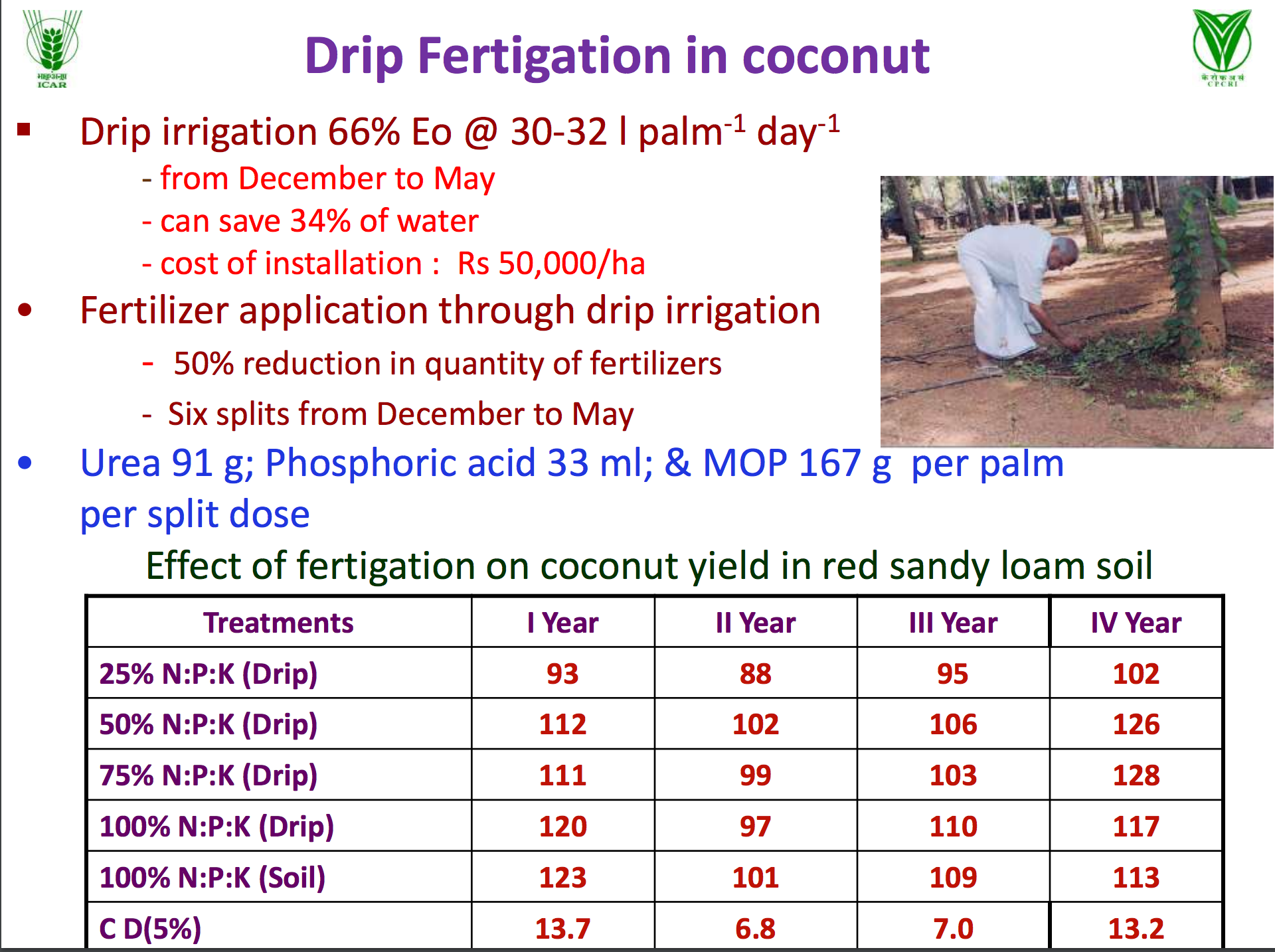press or vermicompost
Coconut India
Which is best suited for the coconut trees? Either press mud or vermicompost ? What can be used for coconut for better yield.
Posted
by: Bharath Krishnan
(4 points)
![]()
Posted: September 2, 2017
Answers
These do not seem like real alternatives. Press mud is the discarded solid waste from sugar cane factories and can be used as nutrient source for soil. Vermicompost is a product of composting that uses worms to break down organic material so that is better able to be used as a soil nutrient.
You can use press mud in vermicomposting. The worms can break that down too which might remove some of the known issues associated with waxy material.
But I think the important question for you is what do you have available?
I have seen very little use of press mud and a lot of information on vermiculture for coconut. Here is a detailed slide show containing a lot of data from UN FAO http://www.fao.org/fileadmin/template...
Below are some more details.
Please provide us more information so we can better help you
Here are some details from a review on sugarcane press mud
"Sugarcane press mud: Press mud or filter cake, a waste by-product from sugar factories, is a soft,
spongy, amorphous and dark brown to brownish material, which contains sugar, fiber, coagulated
colloids, including, cane wax, albuminoids, inorganic salts and soil particles. Ghulam et al.
(2010) reported that the sugar press residue (SPR) or press mud is a potential source of major minerals (Ca -2.40%, P -1.27%, K -1.81%, Mg -1.28%,
S -2.62%) as well as trace elements (Cu -22.6 ppm, Fe -2042.0 ppm, Zn -36.5 ppm, Mn -228.0 ppm).
Razzaq (2001) also reported that substituting chemical fertilisers with sugarcane filter cake in
crop production will add sulfur and boost up organic matter status of soil to satisfactory level
within 5-6 years and improve and maintain soil
health.
"Vermi-Composting
Vermiculture is the culturing of earthworms. Recent years, much interest
in vermiculture has been paid by the large producers and farmers as earthworms
play a major role in soil improvement, organic matter decomposition and in
enhancing the quality of agricultural produce. Vermi-composting is applied for
composting various non-toxic organic solids and liquid wastes available from
cities, dairies, sugar and distillery units, pulp and paper mills, tanneries,
fermentation industries and food processing units. Earthworms are used as
biodegraders for composting such refuse, after the thermophilic activities have
subsided. In vegetable and plantation crops where mulching with organic debris
is a common practice, application of vermicastings at the rate of 5 tonnes/ ha as
the first layer is recommended. Vermicastings consisting of excreta of
earthworms and the cocoons released by them are rich in organic matter and
plant nutrients. In the presence of vermicasts the declay of orgnic refuses and
the formation of compost is accelerated. The process could be continued
uninterruptedly by the addition of dung and other organic wastes at regular
intervals to serve as food source for the earthworms. "
You can use press mud in vermicomposting. The worms can break that down too which might remove some of the known issues associated with waxy material.
But I think the important question for you is what do you have available?
I have seen very little use of press mud and a lot of information on vermiculture for coconut. Here is a detailed slide show containing a lot of data from UN FAO http://www.fao.org/fileadmin/template...
Below are some more details.
Please provide us more information so we can better help you
Here are some details from a review on sugarcane press mud
"Sugarcane press mud: Press mud or filter cake, a waste by-product from sugar factories, is a soft,
spongy, amorphous and dark brown to brownish material, which contains sugar, fiber, coagulated
colloids, including, cane wax, albuminoids, inorganic salts and soil particles. Ghulam et al.
(2010) reported that the sugar press residue (SPR) or press mud is a potential source of major minerals (Ca -2.40%, P -1.27%, K -1.81%, Mg -1.28%,
S -2.62%) as well as trace elements (Cu -22.6 ppm, Fe -2042.0 ppm, Zn -36.5 ppm, Mn -228.0 ppm).
Razzaq (2001) also reported that substituting chemical fertilisers with sugarcane filter cake in
crop production will add sulfur and boost up organic matter status of soil to satisfactory level
within 5-6 years and improve and maintain soil
health.
"Vermi-Composting
Vermiculture is the culturing of earthworms. Recent years, much interest
in vermiculture has been paid by the large producers and farmers as earthworms
play a major role in soil improvement, organic matter decomposition and in
enhancing the quality of agricultural produce. Vermi-composting is applied for
composting various non-toxic organic solids and liquid wastes available from
cities, dairies, sugar and distillery units, pulp and paper mills, tanneries,
fermentation industries and food processing units. Earthworms are used as
biodegraders for composting such refuse, after the thermophilic activities have
subsided. In vegetable and plantation crops where mulching with organic debris
is a common practice, application of vermicastings at the rate of 5 tonnes/ ha as
the first layer is recommended. Vermicastings consisting of excreta of
earthworms and the cocoons released by them are rich in organic matter and
plant nutrients. In the presence of vermicasts the declay of orgnic refuses and
the formation of compost is accelerated. The process could be continued
uninterruptedly by the addition of dung and other organic wastes at regular
intervals to serve as food source for the earthworms. "
Posted
by: David Hughes
(67 points)
![]()
Posted: September 3, 2017
David Hughes commented,
You need to answer the questions I asked, so we can better help you. over 6 years ago.
You need to answer the questions I asked, so we can better help you. over 6 years ago.
You need to log in if you'd like to add an answer or comment.


0 Comments